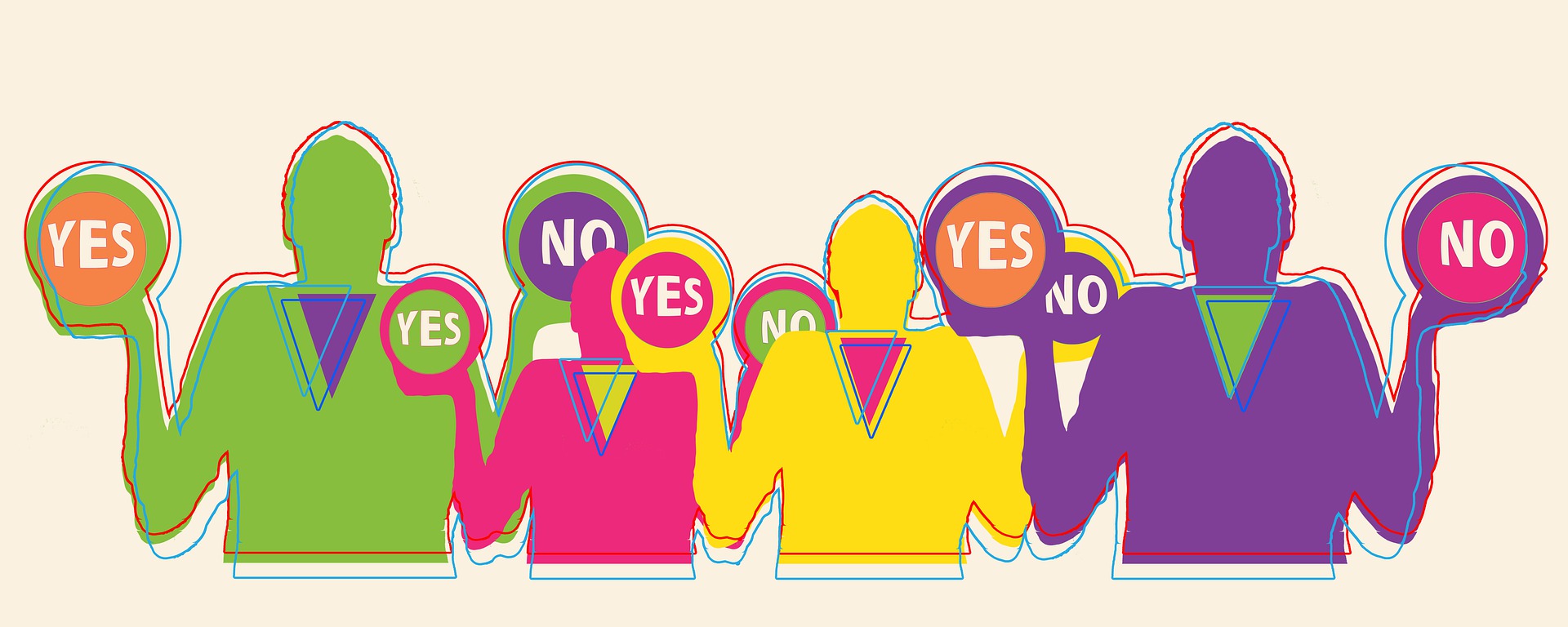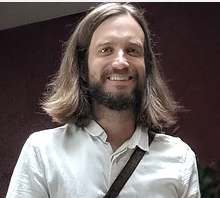“Studying Free Will and Moral Responsibility Over Zoom,” by Kyle Thompson
January 23, 2023
Think about the average Zoom call. You might imagine a business meeting or a long-distance family reunion. You probably don’t picture someone telling a researcher what they think about deep philosophical issues. And yet, during last semester, I conducted a research study on free will and moral responsibility over Zoom. Before I highlight the advantages of bringing new technology to ancient debates, let’s have you consider a classic free will scenario that participants wrestled with in my study:
Imagine there is a universe that is re-created over and over again, starting from the exact same initial conditions and with all the same laws of nature. In this universe the same conditions and the same laws of nature produce the exact same outcomes, so that every single time the universe is re-created, everything must happen the exact same way. For instance, in this universe a person named Jill decides to steal a necklace at a particular time, and every time the universe is re-created, Jill decides to steal the necklace at that time.*
Next, please answer two questions with either yes or no: When Jill steals the necklace, does she act with free will? Wait—you’ll need to unmute yourself and say that again. OK, now I can hear you. Is Jill morally responsible for stealing the necklace?
If you feel like a simple yes or no to these questions doesn’t quite capture your thoughts, you aren’t alone. Participants in my study had lots to say as they put words to their complex ideas. After all, this short scenario is loaded with interesting and complicated details: universes, conditions and necklaces, Oh My! However, other experimental studies on free will do not give participants the opportunity to fully explain and discuss their responses. Rather, participants are usually asked to reply with short, easily categorizable answers: On a scale of 1 to 7, how much do you agree that Jill is morally responsible for stealing the necklace?
In my study, I wanted to avoid boxing participants into neat survey questions. Instead of posting a survey online, never actually verifying that people took it seriously, I invited folks to hop on Zoom and think aloud while they read and reasoned through scenarios such as the one above. Then, to really make sure I recorded what people were thinking, I interviewed them, asking them general and targeted follow-up questions. If this strategy sounds familiar in the context of philosophy, that’s because it is modeled after the Socratic method. Sure, Socrates wasn’t recording pristine audio on Zoom—this is obvious given how few umms and uhhs plague his dialogues—but his approach to discussion is alive in my interviews.**
As my transcripts show, Socrates was right to use open-ended discourse for getting clear on philosophical matters. For example, consider this fascinating response from a participant in my study, where he evaluates Jill’s responsibility two different ways, from his perspective and from the perspective of other people in Jill’s universe:
I would say … uhh … yeah … it’s not … it’s not fair to hold her morally responsible … ummm … because we know that her decisions are not … that they’re all predetermined by the initial conditions however like inside the universe let’s say if they didn’t know … umm … then they might still you know you know blame her and all that but umm … I don’t think it’s fair to hold her morally responsible.
I know it’s difficult to read, but I wanted to leave in all the messiness of human speech to reflect the complexity of how people think on their feet. Fortunately, the meaning is clear. This participant indicates that, from his perspective, Jill is not responsible for stealing the necklace, because the scenario specifies that her choice was inevitable from the start of the universe. However, the participant imagines that people in Jill’s universe wouldn’t know that events were inevitable, so they might hold her accountable. This nuanced, multi-faceted response is not captured by this participant’s survey response of “no” to Jill being responsible—and therein lies the benefit of allowing participants to share their unconstrained thoughts.
Not all the revelations from interviews are philosophically mind-blowing. Sometimes the interview allows for simple misunderstandings to be cleared up. For example, one participant initially selected that Jill did act freely, however he later asked to change his response. What happened? In analyzing the full transcript, one big factor seems to be that the participant had initially placed Jill in our universe, not hers, when selecting whether she was free or not:
I do think that I did ignore the original description a little bit … umm … in this universe … so not I was thinking maybe in terms of our universe but … umm …. when I think in terms of this universe where everything happens … ummm … I wanna say periodically … uhh … yeah…I I’m now I … I now feel like I’m able to think about that a little better now that I’ve eh..had more time to analyze it.
Given how much detail is embedded in the Jill scenario, this participant can be forgiven for misreading the passage. But wait—there might be something else going on. Perhaps many of us face limitations in evaluating someone in another universe. It is plausible that this participant, in reading about a person named Jill, naturally judged her theft according to the worldview that permeates his life in our universe. There’s not enough evidence to say for sure why this participant originally set Jill in our universe, but this moment in his transcript offers something for philosophers to contemplate: can we truly put our universe aside when thinking about Jill’s situation? I suspect the very words used to describe Jill’s actions are burdened with meaning from our world. Recall that “Jill decides to steal a necklace.” If I evaluate her decision, or her act of stealing, I might unintentionally do so against the backdrop of our own universe.
OK, one last example of what dialogue can reveal. After being asked about a different scenario, in which a person named John murders someone in a universe similar to Jill’s, another participant articulates a tension in the philosophy of free will:
I think that John does have free will because…well [laughs lightly, then pauses] … no I don’t think they have f … I don’t think he has free will I changed my mind … I wanna say they have free will especially when we talked about the murder case before like I wanna place blame on him and say he is somewhat and incredibly like morally responsible probably because I mean he probably knows it was morally incorrect to do so to murder someone but … I …I … I don’t think he has free will because if everything is completely caused by what’s happened prior to it then … f… there is no like will there there’s just action based off of a chronological timeline and like …. umm … it follows like it falls like dominoes.
She is torn. On the one hand, she doesn’t think John has free will when he commits murder, given that everything in his universe is determined by previous events. On the other hand, she wants to maintain that John is free and she wants to hold John accountable for his horrific act. The analytic philosopher in me wants the theoretical conclusion to win out: John’s freedom and responsibility should be based on clear conceptual criteria, not what we want to be true. However, as a person embedded in a social world, I can’t help but hold John free and responsible, determinism be damned. At least one thing is clear: the binary response options on the survey don’t capture this participant’s internal conflict.
My work is part of a movement called experimental philosophy, where philosophers use research methods from the social and cognitive sciences to address philosophical questions. The goal is not to resolve philosophical problems, such as the problem of free will, but to expand our understanding of them. For example, the transcripts just highlighted show how fascinating and multifarious people’s judgments are when it comes to free will and moral responsibility. Folks can say that someone is not free or responsible when considered from a God’s-eye view of the world, but that the same person is genuinely free and responsible when considered through the eyes of their peers living in that world. Or, folks can feel a tension between an analytic conclusion regarding free will and their embodied experience of someone’s misbehavior. Any philosophical account of free will that doesn’t take these thoughts seriously will probably fail to make contact with the human condition. Therefore, it matters how philosophers and non-philosophers alike make sense of freedom and responsibility.
That brings us back to Socrates, who spent his time in philosophical dialogue with a range of people he encountered. I can’t say whether he would’ve been an early adopter of Zoom to support his conversation habit, but I do think the tools of the internet age can help carry the torch in the philosopher’s quest to make sense of the human condition.
References
* This scenario and the two follow-up questions are drawn from pages 37–38 of Nahmias et al. (2006). The vignette is quoted directly, though the italics are mine, and I have paraphrased the two questions. The later example of a 7-point scale of agreement is my invention and not derived from the Nahmias et al. study. See Nahmias, E., Morris, S., Nadelhoffer, T., & Turner, J. (2006). Is incompatibilism intuitive? Philosophy and Phenomenological Research, 73(1), 28–53.
** If you have an insatiable appetite for experimental philosophy, you can check out my first interview study, which centers on the relationship between blame and obligation: Thompson, K. (2023). Qualitative methods show that surveys misrepresent “ought implies can” judgments. Philosophical Psychology, 36(1), 29–57.
Kyle Thompson

Kyle Thompson is a philosopher, musician, husband, cat and dog owner, and optimist who teaches philosophy and writing. He believes that teaching should be both engaging and educational, and he works hard to bring both aspects into the classroom (in-person and online). He’s taught at a number of institutions and worked with students of all backgrounds and interests. He says, “I recognize that few students will go on to study philosophy at the graduate level and beyond, which means it is my responsibility to show them the value of philosophizing in a relatively short period of time.”